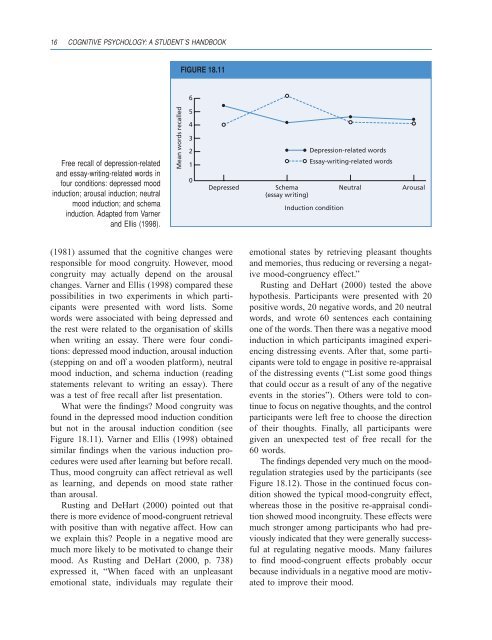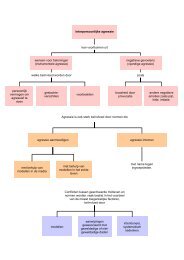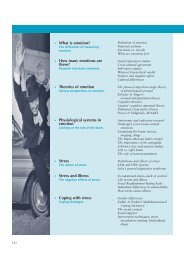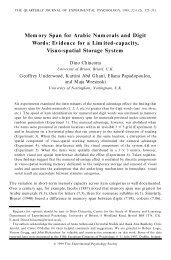Chapter 18: Cognition and Emotion - Psychology Press
Chapter 18: Cognition and Emotion - Psychology Press
Chapter 18: Cognition and Emotion - Psychology Press
You also want an ePaper? Increase the reach of your titles
YUMPU automatically turns print PDFs into web optimized ePapers that Google loves.
16 COGNITIVE PSYCHOLOGY: A STUDENT’S HANDBOOK<br />
Free recall of depression-related<br />
<strong>and</strong> essay-writing-related words in<br />
four conditions: depressed mood<br />
induction; arousal induction; neutral<br />
mood induction; <strong>and</strong> schema<br />
induction. Adapted from Varner<br />
<strong>and</strong> Ellis (1998).<br />
Mean words recalled<br />
FIGURE <strong>18</strong>.11<br />
(1981) assumed that the cognitive changes were<br />
responsible for mood congruity. However, mood<br />
congruity may actually depend on the arousal<br />
changes. Varner <strong>and</strong> Ellis (1998) compared these<br />
possibilities in two experiments in which participants<br />
were presented with word lists. Some<br />
words were associated with being depressed <strong>and</strong><br />
the rest were related to the organisation of skills<br />
when writing an essay. There were four conditions:<br />
depressed mood induction, arousal induction<br />
(stepping on <strong>and</strong> off a wooden platform), neutral<br />
mood induction, <strong>and</strong> schema induction (reading<br />
statements relevant to writing an essay). There<br />
was a test of free recall after list presentation.<br />
What were the findings? Mood congruity was<br />
found in the depressed mood induction condition<br />
but not in the arousal induction condition (see<br />
Figure <strong>18</strong>.11). Varner <strong>and</strong> Ellis (1998) obtained<br />
similar findings when the various induction procedures<br />
were used after learning but before recall.<br />
Thus, mood congruity can affect retrieval as well<br />
as learning, <strong>and</strong> depends on mood state rather<br />
than arousal.<br />
Rusting <strong>and</strong> DeHart (2000) pointed out that<br />
there is more evidence of mood-congruent retrieval<br />
with positive than with negative affect. How can<br />
we explain this? People in a negative mood are<br />
much more likely to be motivated to change their<br />
mood. As Rusting <strong>and</strong> DeHart (2000, p. 738)<br />
expressed it, “When faced with an unpleasant<br />
emotional state, individuals may regulate their<br />
6<br />
5<br />
4<br />
3<br />
2<br />
1<br />
0<br />
Depressed Schema<br />
(essay writing)<br />
Depression-related words<br />
Essay-writing-related words<br />
Induction condition<br />
Neutral Arousal<br />
emotional states by retrieving pleasant thoughts<br />
<strong>and</strong> memories, thus reducing or reversing a negative<br />
mood-congruency effect.”<br />
Rusting <strong>and</strong> DeHart (2000) tested the above<br />
hypothesis. Participants were presented with 20<br />
positive words, 20 negative words, <strong>and</strong> 20 neutral<br />
words, <strong>and</strong> wrote 60 sentences each containing<br />
one of the words. Then there was a negative mood<br />
induction in which participants imagined experiencing<br />
distressing events. After that, some participants<br />
were told to engage in positive re-appraisal<br />
of the distressing events (“List some good things<br />
that could occur as a result of any of the negative<br />
events in the stories”). Others were told to continue<br />
to focus on negative thoughts, <strong>and</strong> the control<br />
participants were left free to choose the direction<br />
of their thoughts. Finally, all participants were<br />
given an unexpected test of free recall for the<br />
60 words.<br />
The findings depended very much on the moodregulation<br />
strategies used by the participants (see<br />
Figure <strong>18</strong>.12). Those in the continued focus condition<br />
showed the typical mood-congruity effect,<br />
whereas those in the positive re-appraisal condition<br />
showed mood incongruity. These effects were<br />
much stronger among participants who had previously<br />
indicated that they were generally successful<br />
at regulating negative moods. Many failures<br />
to find mood-congruent effects probably occur<br />
because individuals in a negative mood are motivated<br />
to improve their mood.





